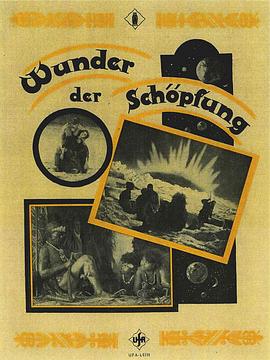更新时间:2024-04-11 05:20
详细剧情
Wunder der Schöpfung is an extraordinary, fascinating Kulturfilm trying to explain the whole human knowledge of the 1920s about the world and the universe. 15 special effects experts and 9 cameramen were involved in the production of this film which combines documentary scenes, historical documents, fiction elements, animation scenes and educational impact. It its beautifully colored, using tinting and toning in a very elaborated way. Some visual ideas in the sequences with a space shuttle visiting different planets in the universe seem to have to be the inspiration for Stanley Kubrick's 2001: A Space Odyssey. In the context of Germany's Kulturfilm phenomenon, Wunder der Schöpfung was among the greatest achievements of the 1920s. The production was constructed, rehearsed, and shot over a period of two and a half years, under the supervision of Hanns Walter Kornblum. The idea to describe the universe and man's place in it well suited UFA's Grossfilm mentality, one year before the Metropolis catastrophe. Hundreds of skilled craftsmen participated in the project, building props and constructing scale models drawn by 15 special effects draughtsmen, while 9 cameramen in separate units worked on the historical, documentary, fiction, animation, and science-fiction sequences. Without star roles or even protagonists, the film's plot is crowded with meticulously structured and skillfully acted single scenes an artful mosaic of small vignettes. No less than four credited university professors ensured the factual background behind the scientific and historical events portrayed. The film's symbol of progress and the new scientific era is a spacecraft, travelling through the Milky Way, making all the planets and their inspiring worlds familiar to us, with the extravaganza of their distinctive features. The film's educational intentions, however, become steadily more obscure, humorous, or even campy as this popularization project proceeds. With the excuse of presenting the end of the world a not-so-new concept as a new, undeniably scientific truth, the film veers happily along a new path, displaying detailed apocalyptic scenes of the end of mankind. For today's audiences, this amazing film demonstrates how the universe was comprehended in the 1920s, and how that view was sold to contemporary audiences.





















挺有意思的科教片
多谢兄弟的翻译,非常有意思的片,里面的特效很有趣,还拍了星际旅行的遐想,对太空失重的知识以现在的眼光来看很天真很可爱
已有
3.5 电影初时代我们所认识的宇宙。
情境构建的方式好有趣
6。天像普及科幻片,行星转啊转
3.5;以今日眼光看,当然觉得这些科普知识并无新奇,不过特效已经相当厉害了,且有一种神秘的古早味,默片时期的想象力和创造力的确让人赞叹。剧情部分亦贴合整体叙述。
画面非常精致(特效是不是在那个时代算是相当厉害了?Aber sehr langweilig...
良心科普片 在特效技术还处于启蒙阶段的一百年前 画面能有如此表现力实属不易 几千年来 人类的心灵总是在沉思苍天的谜语 人要在存在中把握幸福 宇宙在永恒不灭的法则中将生命的宝藏维护贮存 宇宙因而装点得更加美丽动人
太空科教片,充满了许多原始而有趣的想象。思想者最大的幸福莫过于研究所能研究之物,对于不能研究之事则默默地敬畏。任何实在物不会分化为无!永恒在万物身上奋发开去。你要在存在中把握你的幸福!存在永恒不灭:须知法则会降生命的宝藏维护贮存,宇宙因而装点得美丽喜人。
带着现代经验的眼光再看反而有了陌生化的乐趣
有趣的早期宇宙科普
这部科教片字幕卡和模型动画占了90%,略显枯燥。主要对当时对宇宙的认识做了阐述。
很珍贵的影像资料,看下来想起了小时候捧着百科全书看天文知识,不过图像都是静态的,通过文字想象真实的场景,当时若是能看到这样的影片一定很新奇,到处都是特摄,但是制作精良,模拟出很多想象中才有的画面,这些在今天看来并不稀奇,但呈表现的主题值得参考。影片的另一有趣之处在于,有一些因所处时代而具有局限性的内容,比如电力驱动的宇宙飞船,超光速后的时光倒流,可以感受到当时人们对世界的理解。
相当入胜
每一次仰望浩瀚的宇宙,行星在各自的轨道上井然有序地舞蹈,我都感觉内心的小宇宙迸发出无限的力量,恒星长盛不衰地燃烧,仿佛冲破胸口,与广袤的宇宙欣喜遇见“你左手和右手的原子可能来自两颗不同的星辰”,你就是宇宙的孩子星辰的痕迹和生命体的孕育都是造物的奇迹
无声年代的天文学科普片,满怀诚意地以模型、动画及真人表演向大众讲解宇宙奥秘,足够深入浅出了。视觉表达带有鲜明的表现主义时代烙印。它还几次提到中国的天文学贡献
无意中得到此片,让我大吃一惊,当时竟然就有如此精湛的特效,定格动画、机械模型、合成技术、特摄,用了一个遍啦。对于当时的影视从业者,拍此类科幻电影,是一个手艺活儿!
2020-08-15
制作挺精良的,比80年代以后的一些德国纪录片有诚意多了,至少画面清晰构图有章法没有唠唠叨叨虚假的旁白和闻所未闻出来说一句屁话的教授专家。